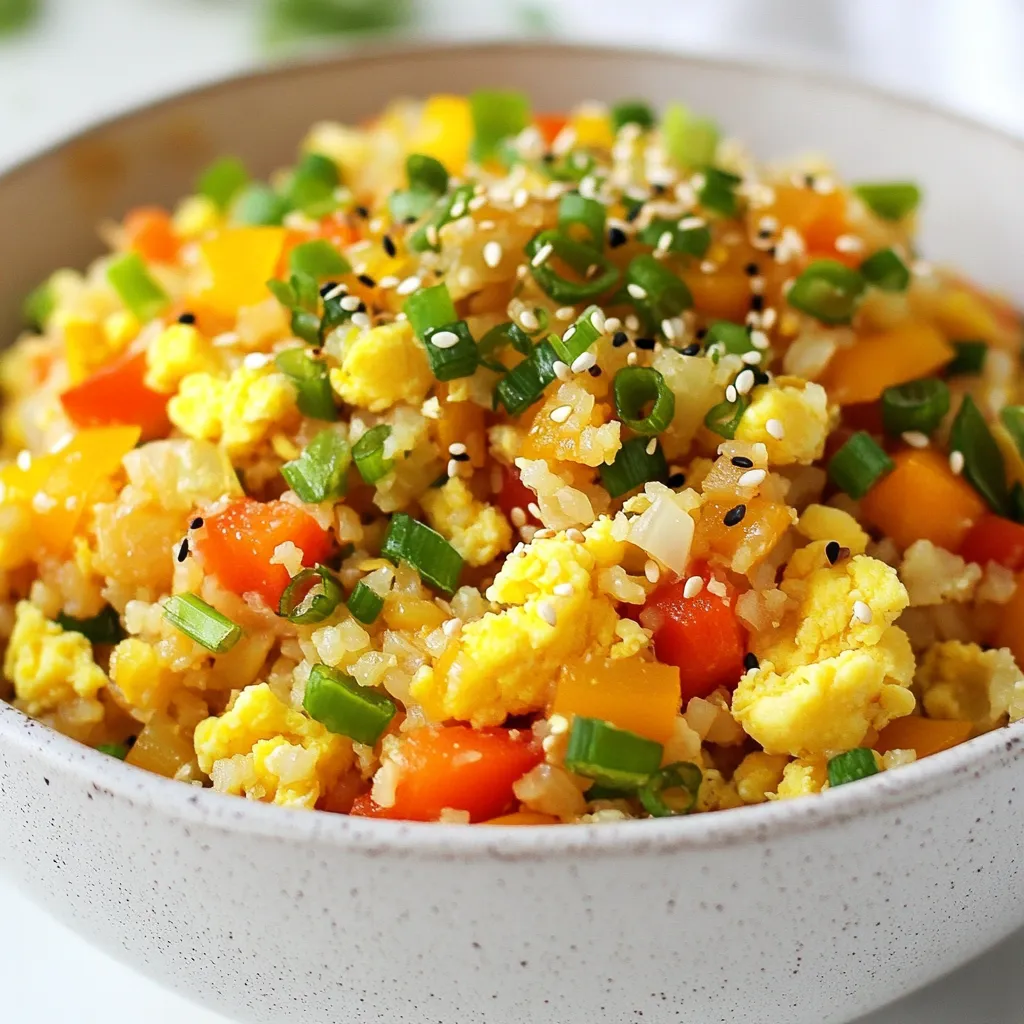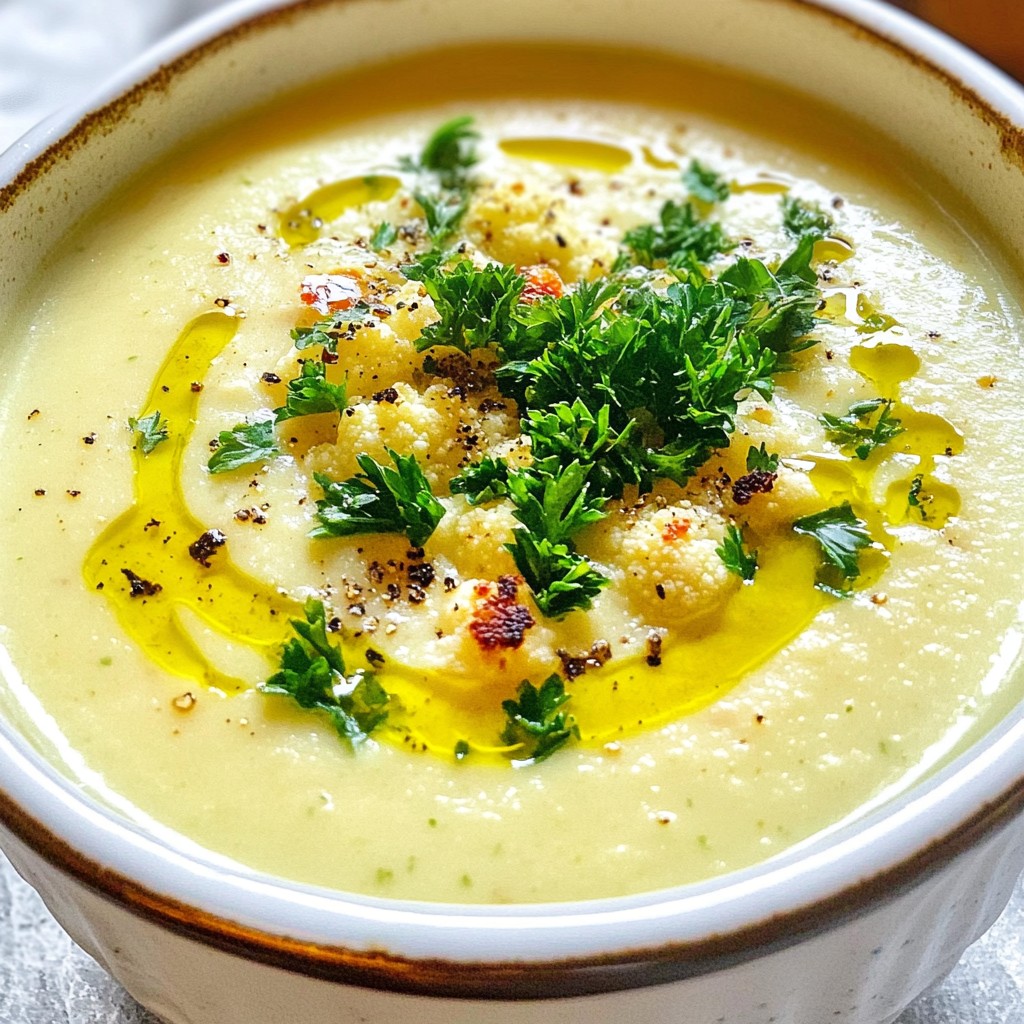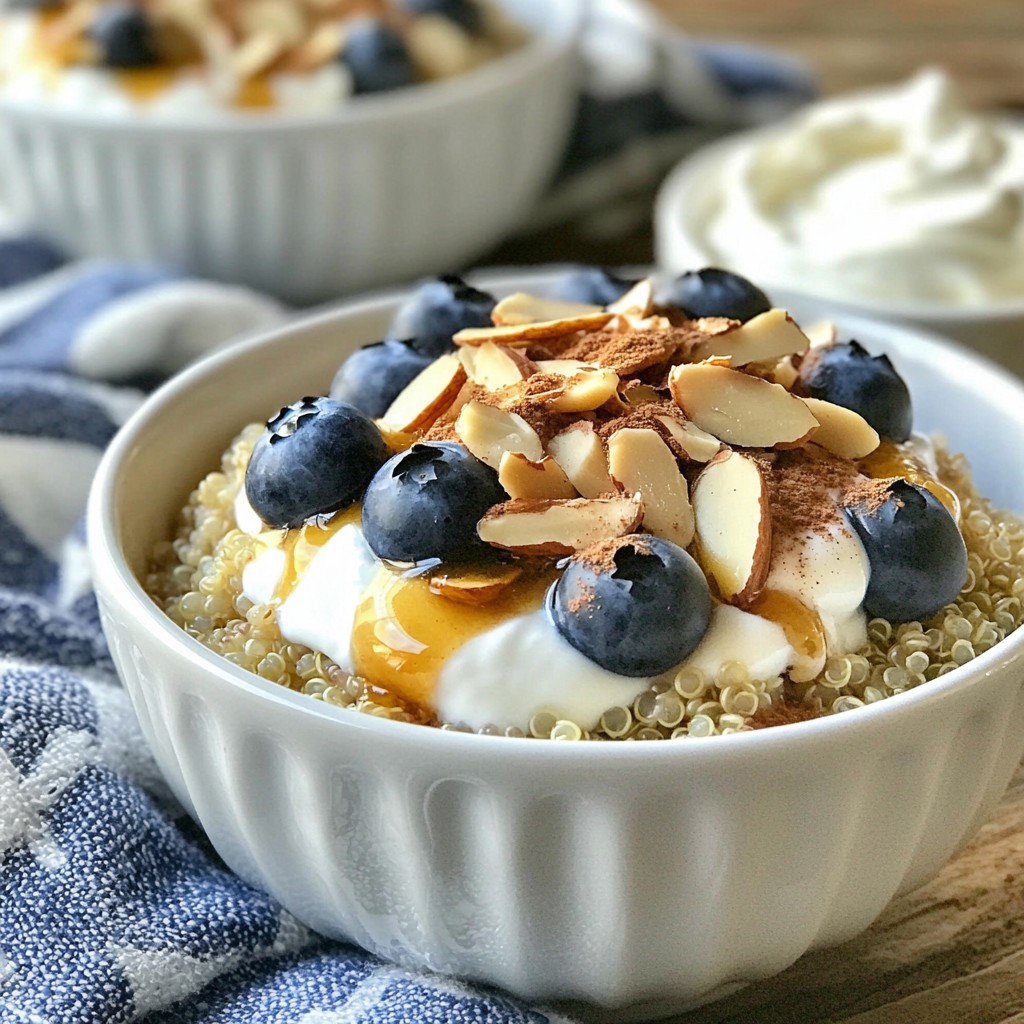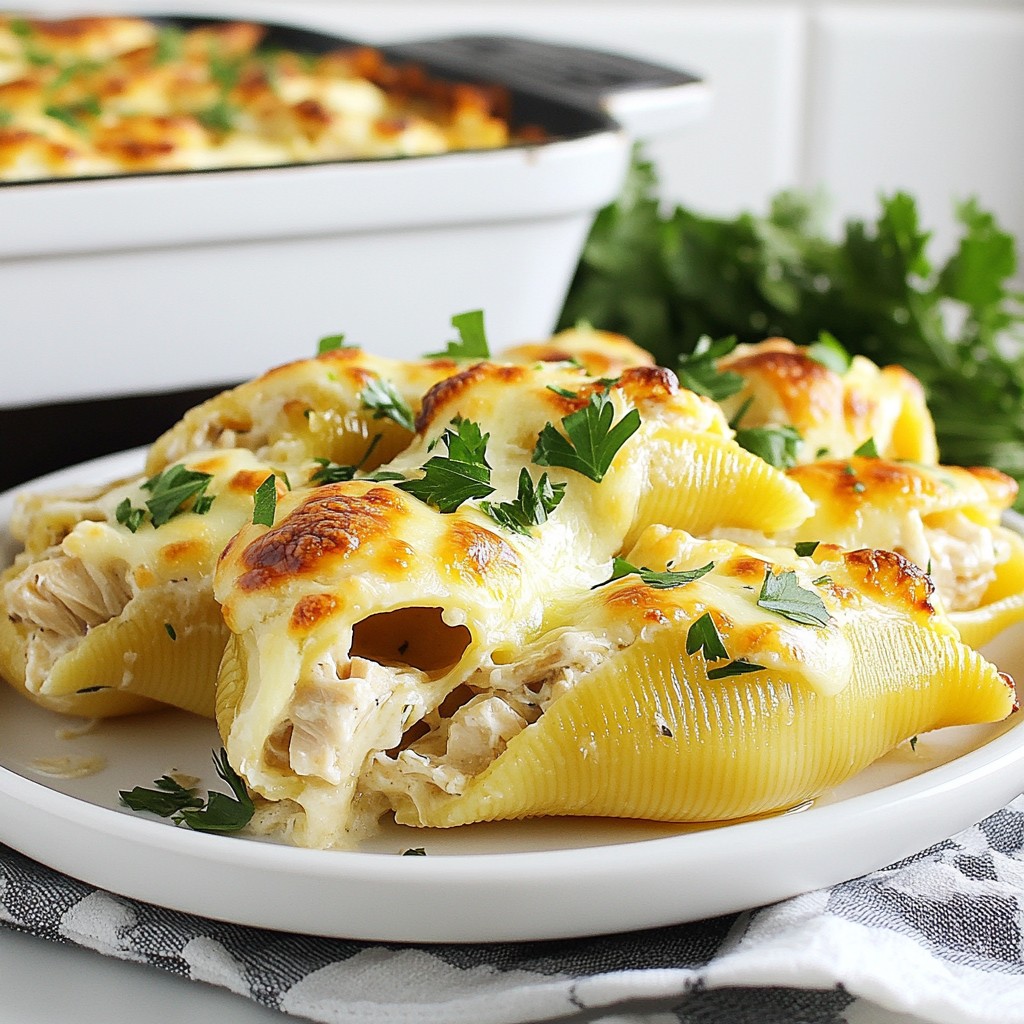Are you ready to transform your meals with a healthy twist? In this article, I’ll guide you through making delicious Cauliflower Fried Rice. Packed with fresh veggies and flavors, this dish is easy to whip up. It’s not just light on carbs but also full of taste! Whether you’re a beginner or a seasoned cook, you’ll enjoy the step-by-step instructions and tips. Let’s get cooking!
Why I Love This Recipe
- Healthy Alternative: This cauliflower fried rice is a lighter, low-carb alternative to traditional fried rice, making it perfect for anyone looking to cut calories while still enjoying a delicious meal.
- Quick and Easy: With a total preparation and cooking time of just 20 minutes, this recipe is ideal for busy weeknights when you need a meal on the table fast.
- Customizable: You can easily swap in your favorite vegetables or proteins, allowing you to tailor the dish to your taste preferences or what you have on hand.
- Flavor Packed: The combination of sesame oil, garlic, and ginger infuses the cauliflower rice with a rich, savory flavor that makes every bite enjoyable.
Ingredients
Main Ingredients for Cauliflower Fried Rice
– Cauliflower: Head to Rice Transformation
Cauliflower is the star of this dish. It transforms into a rice-like texture with a food processor. This veggie is low in carbs and high in fiber. It makes fried rice lighter and healthier.
– Fresh Vegetables: Carrots, Bell Peppers, and Green Onions
I love adding fresh veggies. Diced carrots add sweetness and crunch. Bell peppers bring color and flavor. Green onions offer a mild, fresh taste that brightens the dish.
– Essential Aromatics: Garlic and Ginger
Garlic and ginger create a wonderful aroma. They add depth and warmth to the dish. Minced garlic brings a sharp flavor, while grated ginger adds a slight zing.
Seasonings and Sauces
– Soy Sauce or Tamari: Flavor Base
Soy sauce is a key ingredient. It gives the dish a savory, umami flavor. Tamari is a great gluten-free option. Use it to keep the taste strong and satisfying.
– Rice Vinegar: Extra Flavor Boost
A splash of rice vinegar adds brightness. It balances the savory notes and enhances the overall flavor. This touch makes each bite pop with freshness.
– Optional Add-ins: Peas, Corn, or Other Vegetables
You can mix in peas or corn for extra sweetness. Feel free to add any favorite veggies. This flexibility makes the dish fun and customizable.
Protein Options
– Eggs: Traditional or Substitutes
Beaten eggs are classic in fried rice. They add protein and richness. You can swap them with a plant-based egg substitute for a vegan version.
– Adding Chicken, Tofu, or Shrimp for Extra Protein
Boost the protein by adding cooked chicken, tofu, or shrimp. These options make the dish hearty and filling. Choose what you like best for a personal touch.

Step-by-Step Instructions
Preparation of Cauliflower
To start, trim the outer leaves and thick stem of the cauliflower. Cut the head into smaller florets. Use a food processor to pulse these florets. You want them to look like rice grains. This texture makes the dish light and fluffy. Set the cauliflower rice aside for later use.
Cooking the Vegetables
Next, heat a large skillet or wok over medium-high heat. Pour in the sesame oil. Allow it to warm until it shimmers gently. Add the finely chopped green onions, diced carrot, and bell pepper. Stir-fry these veggies for about 3-4 minutes. You want them to soften and show bright colors.
Now, it’s time to add aromatics. Introduce the minced garlic and grated ginger into the mix. Sauté them for another minute. This step fills your kitchen with a delicious aroma.
Completing the Fried Rice
Push the vegetable mixture to one side of the skillet. Create a clear area for the eggs. Pour the beaten eggs into this space and scramble them gently. Cook until they are firm and no longer runny. Then, combine them with the veggies.
Next, incorporate the cauliflower rice into the skillet. Mix all the ingredients gently. Make sure every grain of cauliflower gets coated with flavor.
Now, drizzle soy sauce and rice vinegar over the mixture. Stir everything well to combine. Season with salt and pepper to your taste. Let it cook for about 5-6 minutes. Stir occasionally, ensuring the cauliflower rice gets tender but still has a slight bite.
If you want more veggies, fold in peas or corn. Cook for an additional 2 minutes to heat them through. Enjoy your delicious cauliflower fried rice!
Tips & Tricks
Achieving the Perfect Texture
How to Prevent Soggy Fried Rice
To keep your cauliflower fried rice from getting soggy, use dry cauliflower. After processing, let it sit for a few minutes. This helps remove excess moisture. Also, cook over high heat. This method ensures that everything cooks quickly, so the rice stays firm.
Choosing the Right Cauliflower Freshness
Fresh cauliflower makes a big difference. Look for heads that are firm and have bright green leaves. Avoid any that show signs of browning or wilting. A fresh head of cauliflower will give you the best texture.
Flavor Enhancements
Experimenting with Seasonings
Don’t be afraid to play with spices! Adding a pinch of chili flakes can give your dish some heat. You can also try adding cumin or smoked paprika for a different twist. These flavors make each bite exciting.
Adding Fresh Herbs for Extra Flavor
Fresh herbs like cilantro or basil can brighten the dish. Chop them finely and sprinkle them on top just before serving. This small step adds a burst of freshness that elevates the meal.
Cooking Tools and Equipment
Best Skillet or Wok to Use
A large skillet or wok works best for frying the rice. It should have a flat bottom to ensure even heat. Non-stick surfaces help prevent sticking, making it easier to stir and toss the ingredients.
Recommended Food Processor for Ricing Cauliflower
When ricing cauliflower, a good food processor makes it fast. Look for a model with a strong motor. It should easily chop the florets into small bits. This ensures uniform size for even cooking.
Pro Tips
- Use Fresh Cauliflower: Always choose a firm and fresh head of cauliflower for the best texture and flavor in your fried rice.
- Don’t Overcook the Cauliflower: Keep a close eye on the cauliflower rice while cooking; it should be tender yet retain a slight crunch for the best eating experience.
- Experiment with Vegetables: Feel free to add your favorite vegetables, such as snap peas or broccoli, to customize the dish and add more nutrition.
- Perfect the Seasoning: Taste as you go! Adjust the soy sauce and seasoning to your preference to balance the flavors perfectly.
Variations
Vegetarian Options
Substituting Eggs with Plant-Based Alternatives
If you want a vegan dish, you can skip the eggs. Use a mix of chickpea flour and water instead. This mix will help bind your fried rice and add protein. It also gives a nice texture.
Adding Tofu for a Protein Boost
Tofu is a great choice for extra protein. Cube firm tofu and sauté it in the skillet before adding the cauliflower rice. This adds a lovely texture and flavor to your dish.
Additional Vegetables to Include
Seasonal Veggies for Flavor Variation
Add seasonal vegetables for new tastes. Think about using zucchini in summer or root veggies in winter. Each season brings fresh flavors that can elevate your dish.
Creative Add-ins: Mushrooms, Broccoli, and More
Mushrooms and broccoli are fantastic choices. They add earthiness and crunch. You can also try bell peppers, peas, or spinach for added nutrients and color.
Flavor Profiles
Making Spicy Cauliflower Fried Rice
Want a kick? Add red pepper flakes or sriracha for heat. You can mix these into the soy sauce for an even spread of spice. It adds a fun twist to your dish.
Sweet and Savory Combinations
Mix sweet and savory flavors for something unique. A dash of pineapple juice or a sprinkle of coconut sugar can elevate the taste. This combo brings a delightful balance to your meal.
Storage Info
How to Store Leftovers
– Refrigeration Guidelines: Cool the fried rice to room temperature. Store in an airtight container. It stays fresh for up to 4 days in the fridge.
– Best Storage Containers to Use: Use glass or BPA-free plastic containers. These help keep your food safe and reduce odors.
Reheating Methods
– Microwave vs. Stovetop: Pros and Cons: The microwave heats quickly but may make the rice soggy. The stovetop takes longer but keeps the texture nice.
– Tips for Preserving Texture During Reheating: Add a splash of water or oil when using the microwave. Stir often on the stovetop to avoid sticking.
Freezing Cauliflower Fried Rice
– Instructions for Freezing and Thawing Effectively: Cool the fried rice first, then portion it into freezer bags. Lay them flat for easy stacking. Thaw in the fridge overnight before reheating.
– Best Practices for Long-Term Storage: Label the bags with the date. Use within 2-3 months for the best taste.
FAQs
Can I use frozen cauliflower rice?
Yes, you can use frozen cauliflower rice. It saves time and is convenient. Frozen cauliflower rice is often pre-processed, making it easy to cook. However, fresh cauliflower rice has a better texture. Frozen rice can become mushy if overcooked. When using frozen rice, cook it straight from the freezer. No need to thaw first.
How many carbs are in cauliflower fried rice?
Cauliflower fried rice is low in carbs. One serving contains about 10 grams of carbs. This is much lower than traditional fried rice. The cauliflower replaces rice, cutting down on carbs. It also gives you fiber and vitamins. This dish is great for low-carb diets.
What can I substitute for soy sauce?
You can substitute soy sauce with tamari for a gluten-free option. Tamari is similar in taste and works well in this recipe. If you want a low-sodium option, try coconut aminos. This adds a sweet, savory flavor without extra salt. You can also use homemade sauces made from broth and spices.
Cauliflower fried rice is a simple, tasty dish. You can transform cauliflower into a rice alternative with fresh veggies, aromatics, and great seasonings. There are many protein choices, like eggs or tofu, to make it filling.
As you cook, keep those tips in mind for the best texture and flavor. Explore various vegetables and seasonings to create your own version. Store leftovers properly, and enjoy this healthy dish multiple times. With these steps, you’ll master cauliflower fried rice and impress anyone who tries i




